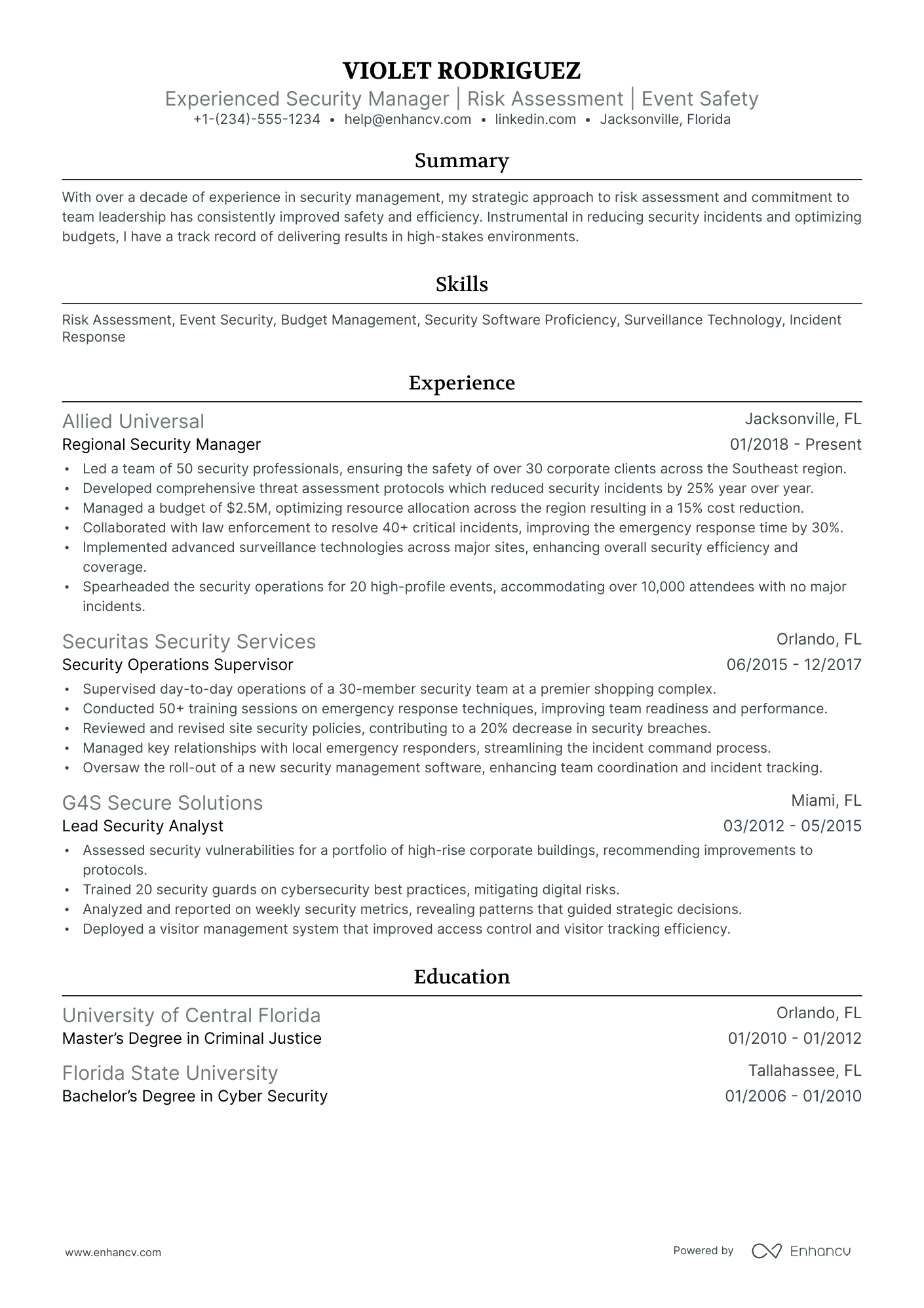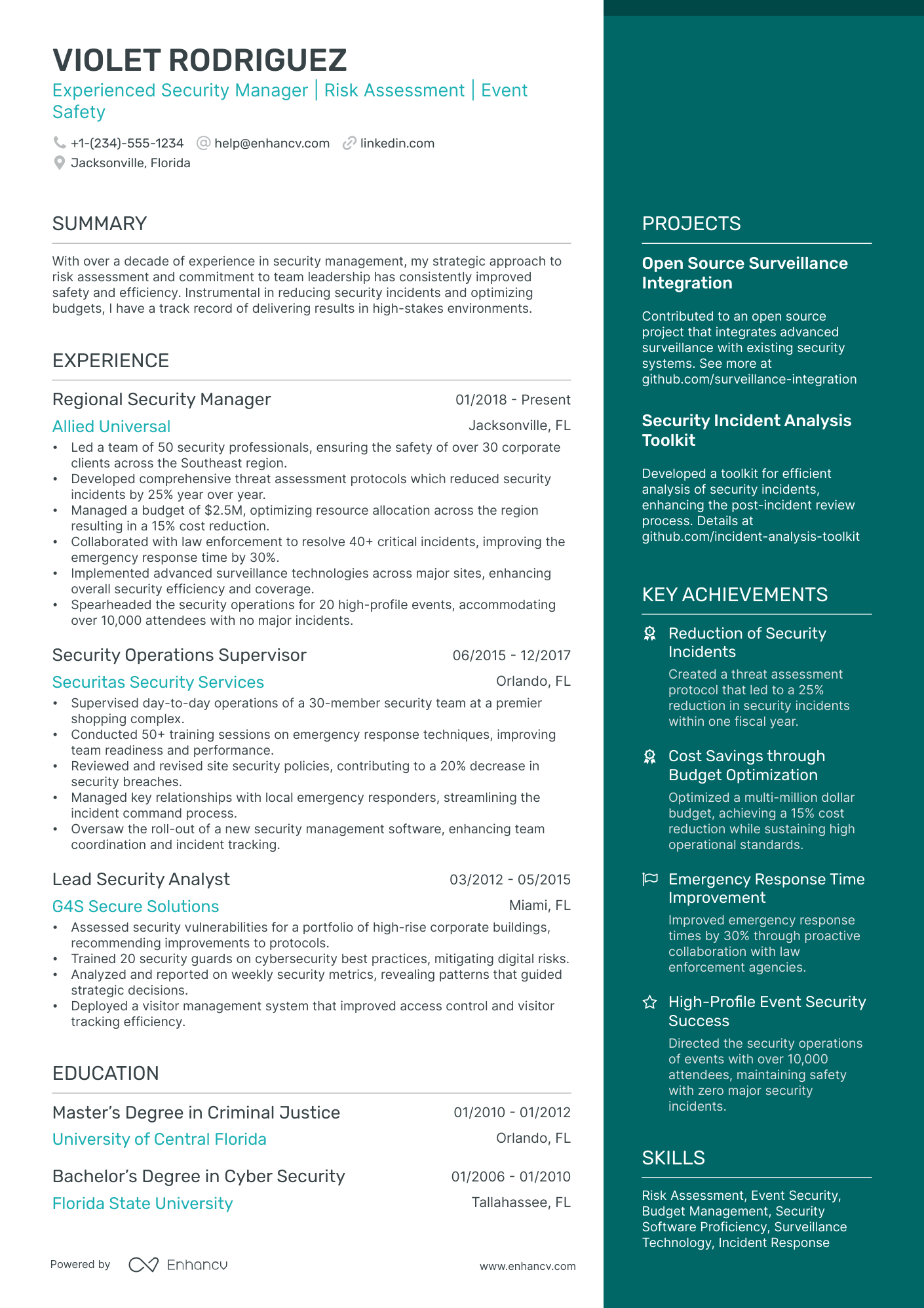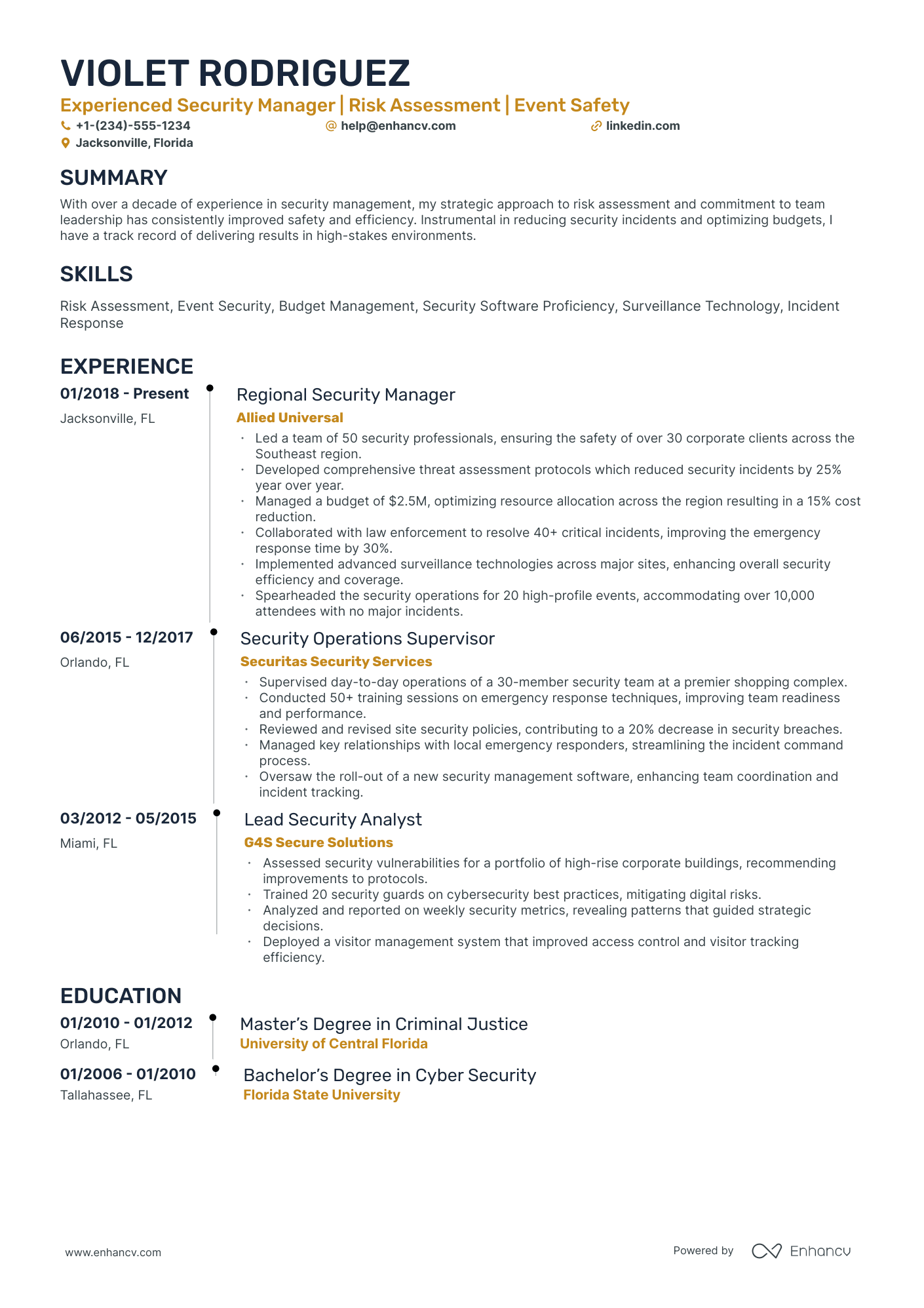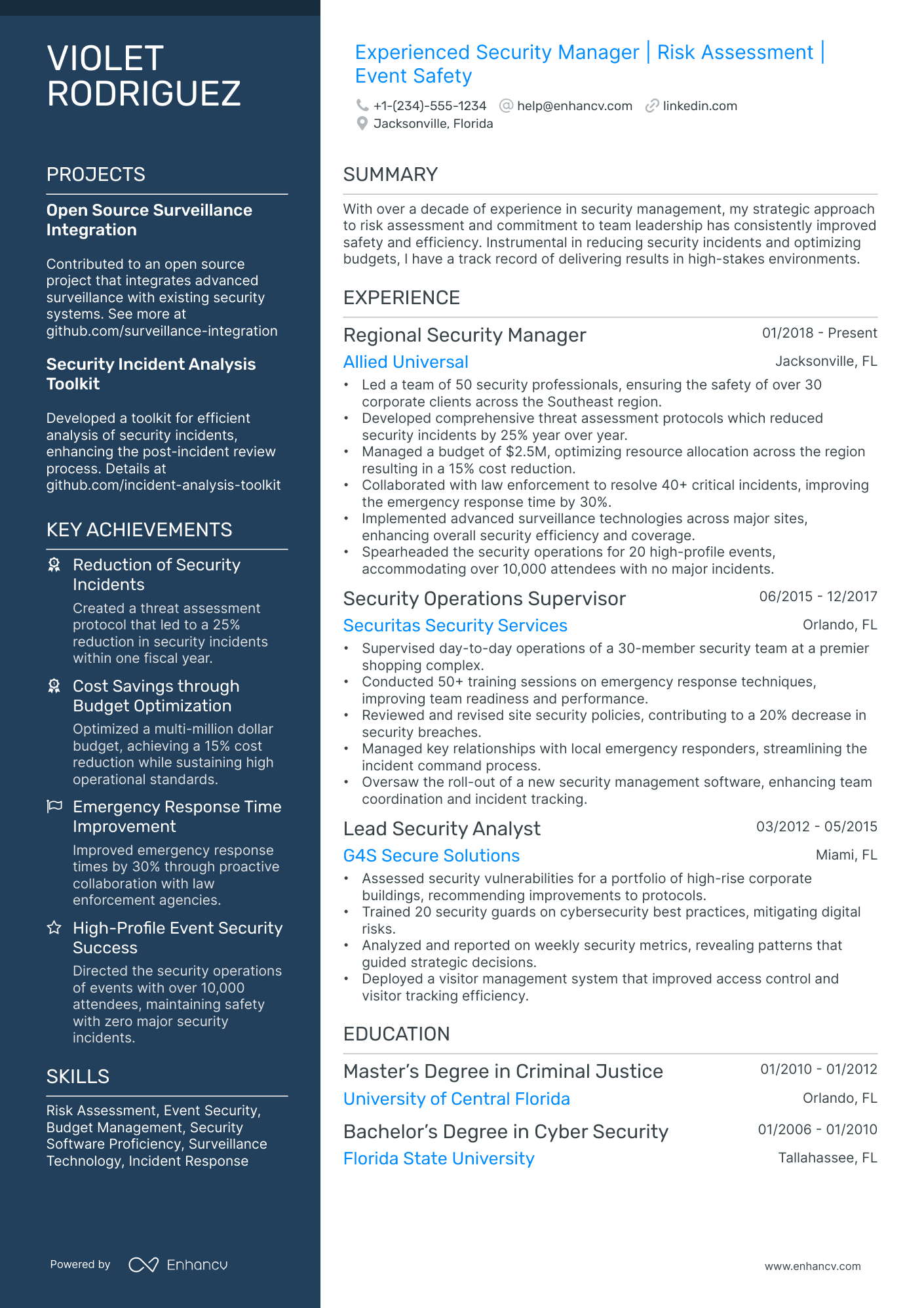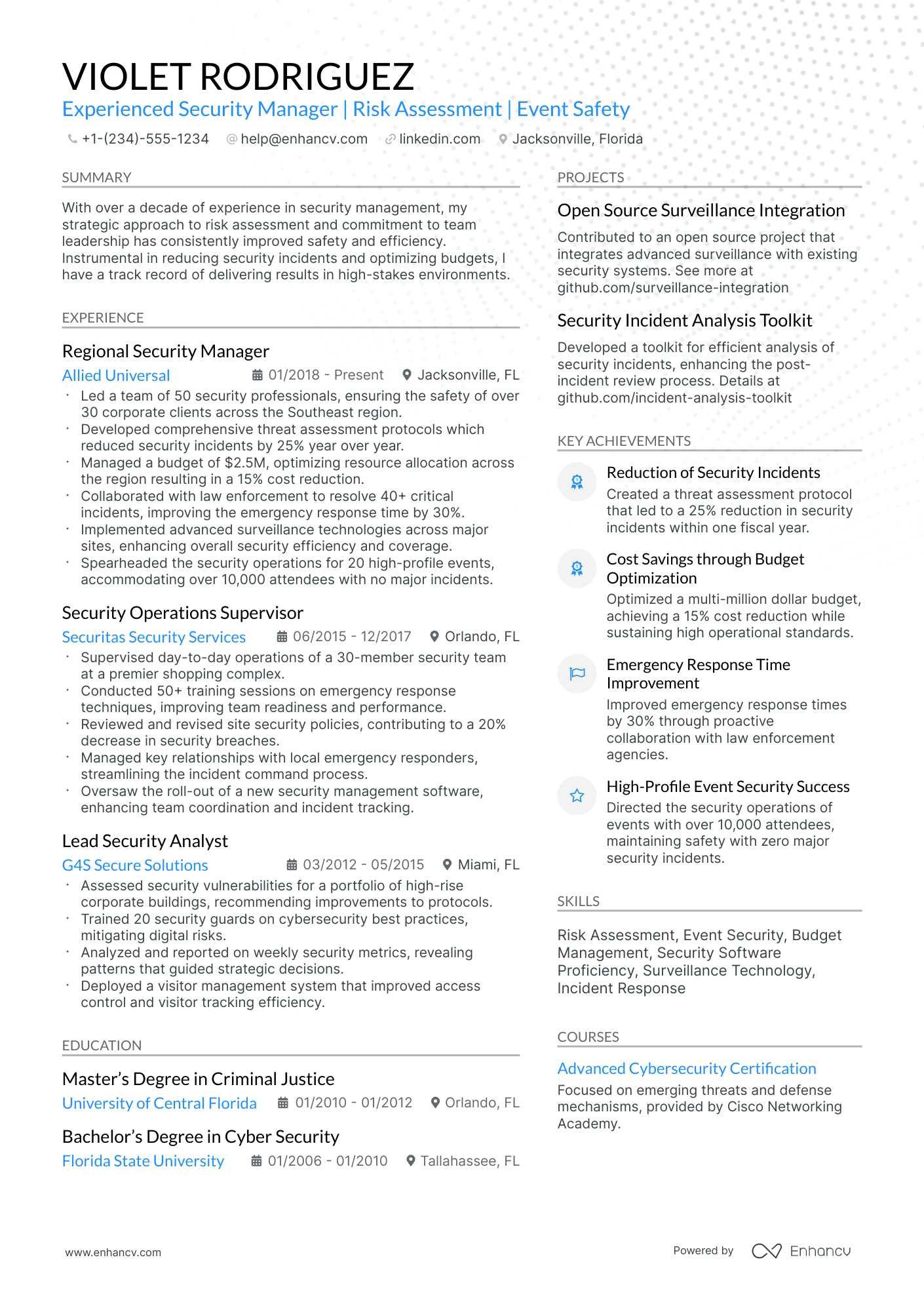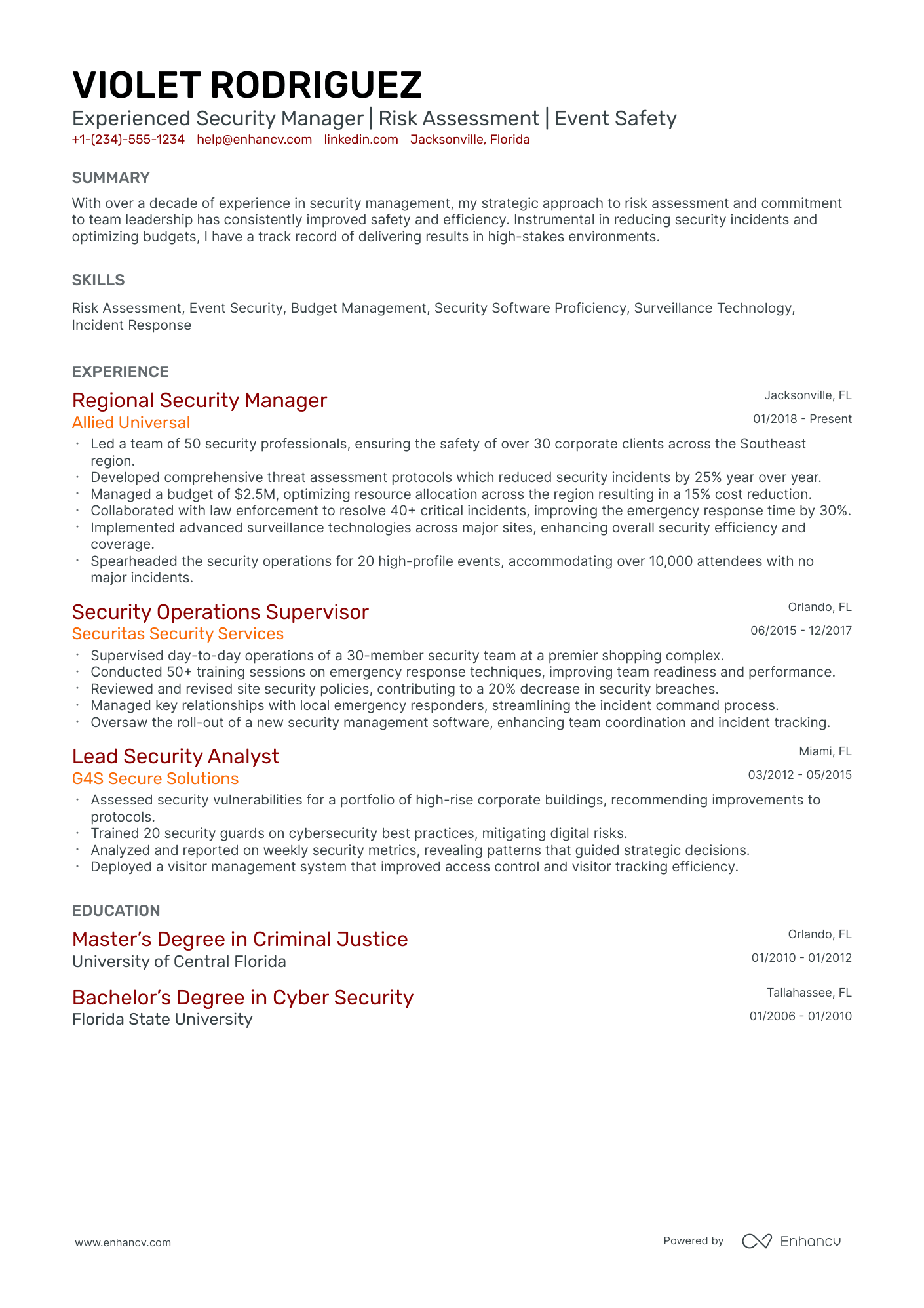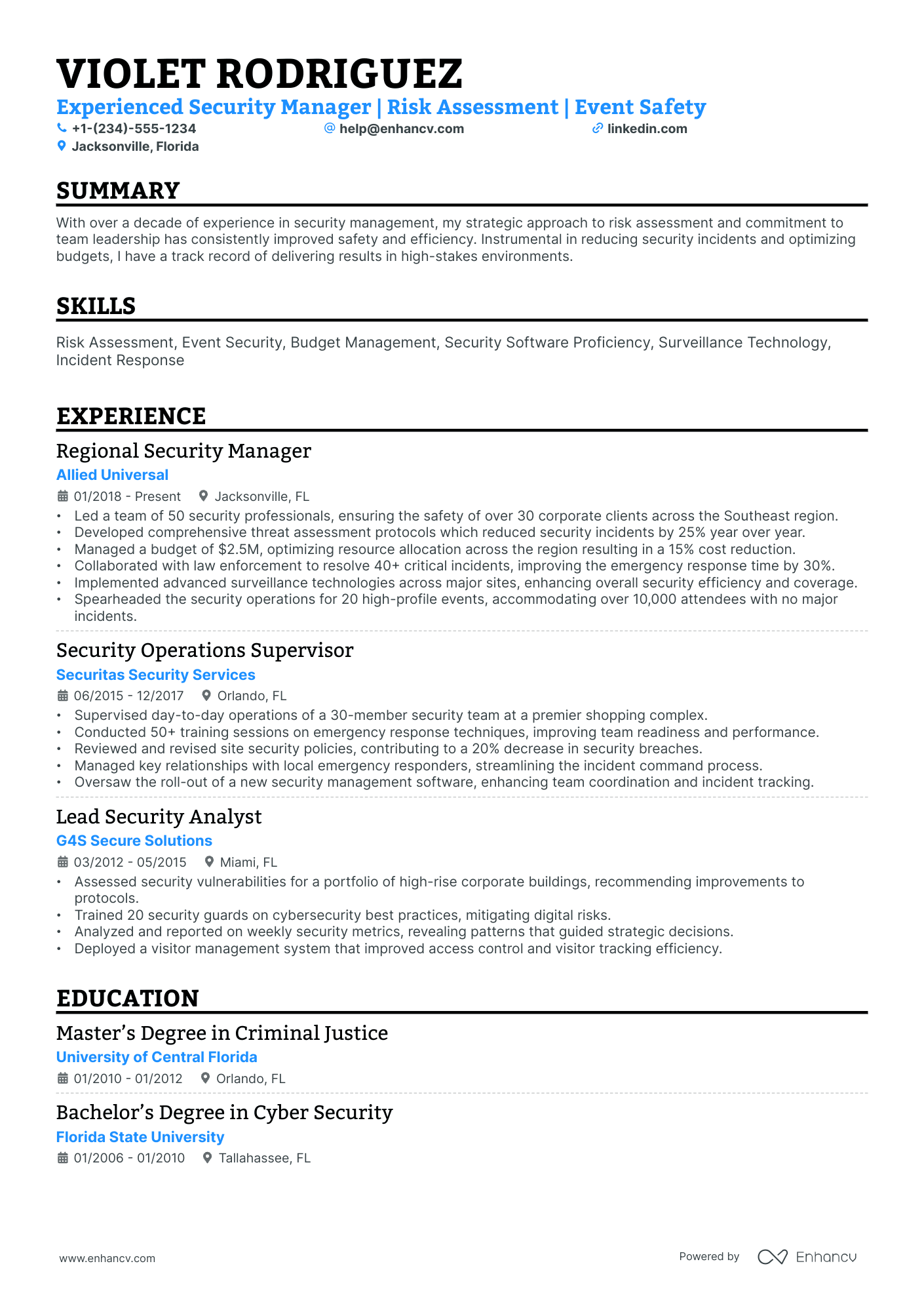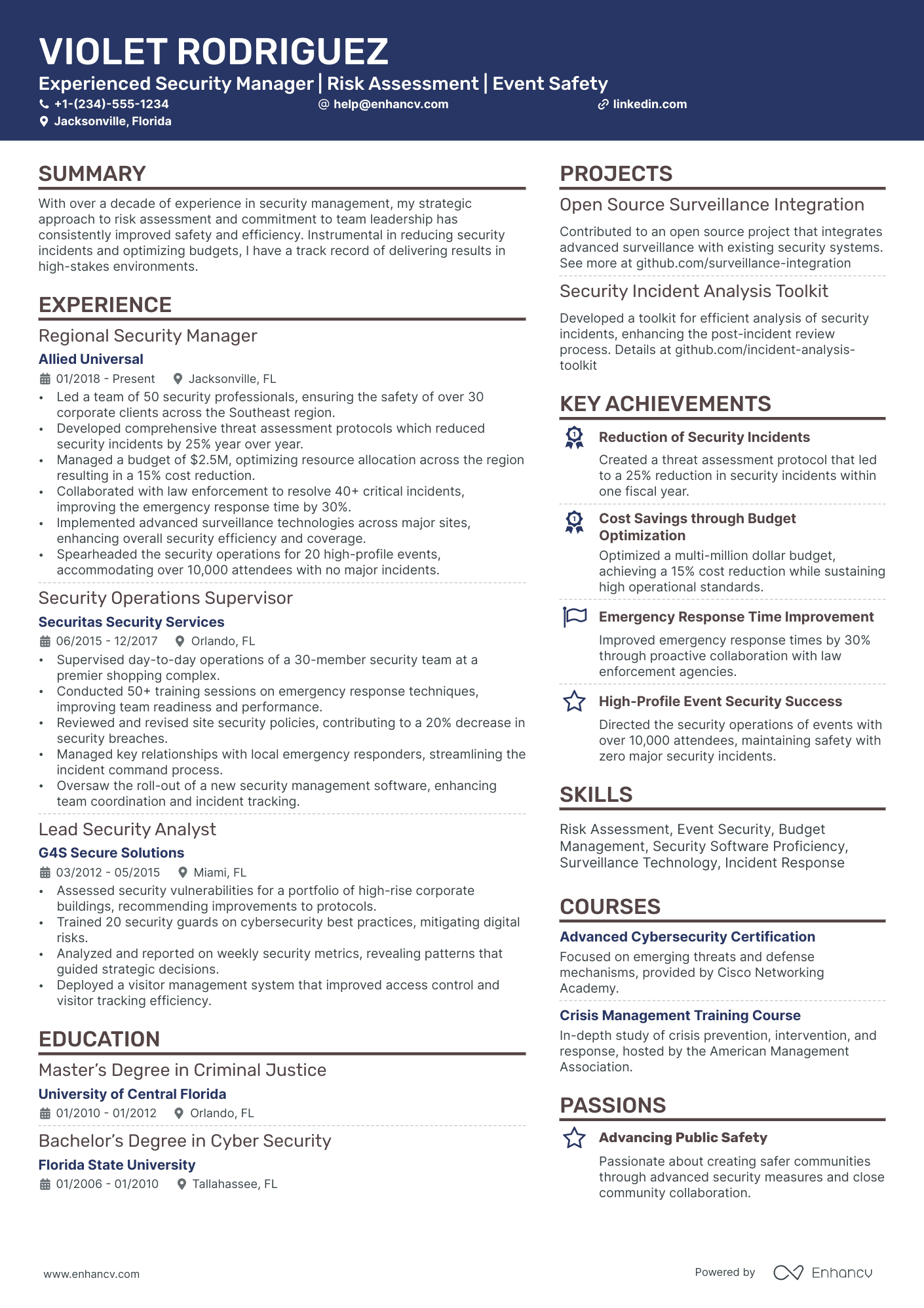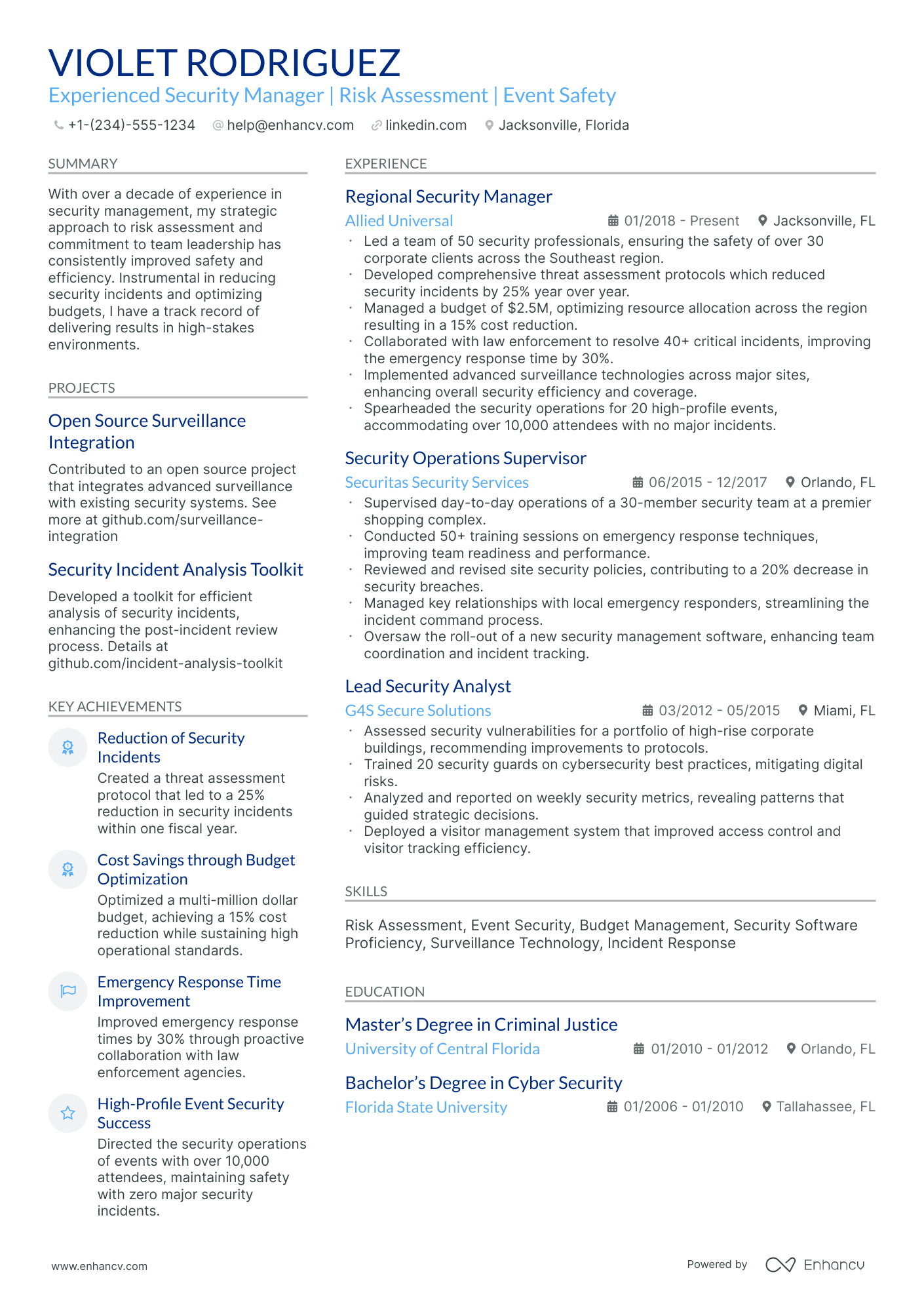Security director resume guides often fail because they bury executive risk leadership under tool lists and generic duties. That hurts in ATS screening and rapid recruiter scans, where competition is high and decision-makers need proof of impact.
A strong resume shows how you reduce risk and improve resilience. Knowing how to make your resume stand out is essential—you should highlight measurable outcomes like incident reduction, audit pass rates, budget savings, response time improvements, enterprise program rollouts, and security maturity gains across business units.
Key takeaways
- Lead every experience bullet with measurable outcomes like incident reduction or cost savings.
- Use reverse-chronological format to showcase progressive security leadership and expanding scope.
- Tailor each resume to the specific posting's frameworks, tools, and KPIs.
- Demonstrate skills through summary and experience bullets, not just a standalone skills list.
- Pair hard security competencies with leadership soft skills like stakeholder alignment and delegation.
- Quantify achievements using detection speed, response time, audit results, and budget figures.
- Use Enhancv to turn vague duties into concise, metrics-driven bullet points faster.
How to format a security director resume
Recruiters evaluating security director candidates prioritize evidence of progressive leadership, enterprise-wide risk management accountability, and measurable impact on organizational security posture. A well-chosen resume format ensures these signals—scope of oversight, strategic decision ownership, and quantified outcomes—are immediately visible rather than buried or fragmented.
I have significant experience in this role—which format should I use?
Use a reverse-chronological format—it's the strongest choice for a security director resume because it foregrounds your leadership trajectory and expanding scope of responsibility. Do:
- Lead each role entry with the breadth of your oversight: team size, budget authority, number of facilities or regions, and direct reporting structure.
- Highlight domain expertise in areas such as physical security, cybersecurity convergence, executive protection, compliance frameworks (ASIS, ISO 27001, NIST), and vendor management.
- Quantify business impact through metrics tied to risk reduction, incident response improvements, cost savings, or audit outcomes.
Why hybrid and functional resumes don't work for senior roles
Hybrid and functional formats fragment or obscure the career progression that hiring committees rely on to evaluate a security director's escalating accountability, leadership scope, and strategic decision ownership. By grouping skills apart from the roles where they were exercised, these formats dilute the context around team leadership, budget authority, and enterprise risk outcomes—exactly the proof points that distinguish a qualified director candidate. Avoid hybrid and functional formats entirely when you have a consistent record of security leadership, as they raise more questions about your trajectory than they answer.
- Edge-case exception: A functional format may be acceptable only if you're transitioning into a security director role from an adjacent senior position (such as IT director or military command) and have limited direct security titles on your resume—but even then, every listed skill must be anchored to a specific project, initiative, or measurable outcome.
With your layout and structure in place, the next step is filling it with the right sections to present your qualifications effectively.
What sections should go on a security director resume
Recruiters expect to see clear proof you've led security strategy, reduced risk, and delivered measurable improvements across people, process, and technology. Understanding what to put on a resume at the director level is critical for making the right impression. Use this structure for maximum clarity:
- Header
- Summary
- Experience
- Skills
- Projects
- Education
- Certifications
- Optional sections: Awards, Publications, Volunteering
Strong experience bullets should emphasize measurable impact, risk reduction outcomes, program scope, budget and team ownership, and business results.
Is your resume good enough?
Drop your resume here or choose a file. PDF & DOCX only. Max 2MB file size.
Now that you’ve organized the resume with the right components, the next step is to write your security director resume experience so it fits that structure and shows impact clearly.
How to write your security director resume experience
The experience section is where you prove you've delivered results—not just held a title. Hiring managers screening security director candidates prioritize demonstrated impact, including the programs you've built, the risk frameworks you've deployed, and the measurable outcomes you've driven, over generic task lists. Writing a targeted resume ensures each bullet speaks directly to what the hiring team needs to see.
Each entry should include:
- Job title
- Company and location (or remote)
- Dates of employment (month and year)
Three to five concise bullet points showing what you owned, how you executed, and what outcomes you delivered:
- Ownership scope: the security programs, physical or cybersecurity operations, compliance domains, threat intelligence platforms, or teams you were directly accountable for as a security director.
- Execution approach: the frameworks, risk assessment methodologies, incident response protocols, surveillance technologies, or regulatory standards you applied to make strategic decisions and deliver work.
- Value improved: the changes you drove in organizational risk posture, incident response time, regulatory compliance, vulnerability reduction, asset protection, or operational continuity.
- Collaboration context: how you partnered with executive leadership, legal counsel, IT departments, law enforcement agencies, facilities teams, or external auditors to advance security objectives.
- Impact delivered: the outcomes you produced expressed through business resilience, threat mitigation at scale, budget optimization, or enterprise-wide security improvements rather than routine activity descriptions.
Experience bullet formula
A security director experience example
✅ Right example - modern, quantified, specific.
Director of Security
Arcstone Health | Austin, TX
2021–Present
HIPAA-regulated digital health platform supporting two million patients and eight hundred clinicians across the US.
- Led an enterprise security program aligned to NIST Cybersecurity Framework and ISO 27001, cutting high-severity audit findings by 68% and reducing policy exceptions by 41% within twelve months.
- Implemented zero trust access with Okta, conditional access, and privileged access management (CyberArk), reducing unauthorized access attempts by 52% and shrinking privileged standing access by 73%.
- Built a detection and response function using Splunk, CrowdStrike Falcon, and SentinelOne, lowering mean time to detect from fourteen hours to fifty minutes and mean time to respond from thirty-six hours to four hours.
- Partnered with engineering and product to embed security into continuous integration and continuous delivery using Snyk, Semgrep, and infrastructure as code scanning (Terraform), cutting critical vulnerabilities in production by 58% and increasing remediation within fourteen days from 44% to 89%.
- Directed third-party risk management across one hundred forty vendors using SIG questionnaires and contract controls, preventing three high-risk renewals and reducing average onboarding time by 22% through standardized security reviews with procurement and legal.
Now that you've seen how a strong experience section comes together, let's look at how to adjust yours to match the specific security director role you're targeting.
How to tailor your security director resume experience
Recruiters evaluate your security director resume through applicant tracking systems and manual review, scoring how closely your experience matches the posting. Tailoring your resume to the job description ensures your qualifications surface during both screening stages.
Ways to tailor your security director experience:
- Match security platforms and access control systems named in the job description.
- Mirror the exact compliance frameworks like ISO 27001 or NIST referenced.
- Reflect threat assessment methodologies the employer uses in daily operations.
- Quantify results using the same KPIs or success criteria the posting highlights.
- Include industry-specific experience such as healthcare or financial services when requested.
- Align your leadership scope with the team size and structure described.
- Reference the physical or cybersecurity focus area the role prioritizes.
- Highlight cross-departmental collaboration models or reporting structures the posting outlines.
Tailoring means aligning your real accomplishments with what the employer specifically asks for, not forcing disconnected keywords into your bullet points.
Resume tailoring examples for security director
| Job description excerpt | Untailored | Tailored |
|---|---|---|
| Lead enterprise-wide physical security operations across 50+ facilities, managing a team of 200+ security personnel and coordinating with local law enforcement agencies. | Managed security operations and supervised staff across multiple locations. | Directed physical security operations across 54 corporate facilities, leading a 210-person team and establishing joint response protocols with 12 local law enforcement agencies that reduced incident response time by 35%. |
| Develop and implement risk assessment frameworks using ASIS standards, oversee access control systems (Lenel OnGuard), and ensure compliance with CFATS and MTSA regulations. | Conducted risk assessments and helped maintain compliance with security regulations. | Built a risk assessment framework aligned with ASIS SPC.1-2009 standards, managed Lenel OnGuard access control across 30 entry points, and led audit preparation that achieved full CFATS and MTSA compliance for three consecutive review cycles. |
| Design and manage the organization's executive protection program, including threat intelligence analysis, travel security planning, and crisis management for C-suite leadership. | Provided security support for senior leadership and handled crisis situations as needed. | Designed an executive protection program for eight C-suite leaders, integrating real-time threat intelligence feeds into travel security planning and building a crisis management playbook that was activated during 14 international trips with zero security incidents. |
Once you’ve aligned your experience with the role’s priorities, the next step is to quantify your security director achievements so hiring teams can see the impact of that work.
How to quantify your security director achievements
Quantifying your achievements shows how your security program reduced risk and improved resilience. Focus on incident reduction, mean time to detect and respond, audit outcomes, cost avoidance, and coverage across users, sites, and critical systems.
Quantifying examples for security director
| Metric | Example |
|---|---|
| Incident reduction | "Cut high-severity security incidents 38% year over year by rolling out EDR (CrowdStrike) and tightening privileged access in Okta across 4,200 endpoints." |
| Detection speed | "Reduced mean time to detect from 14 hours to 45 minutes by tuning SIEM (Splunk) correlation rules and onboarding 120 new log sources." |
| Response efficiency | "Improved mean time to respond from 9 hours to 2.5 hours by implementing SOAR (Palo Alto Cortex XSOAR) playbooks for phishing and malware triage." |
| Compliance quality | "Achieved ISO 27001 recertification with zero major nonconformities and closed 27 audit findings within 60 days using a tracked remediation plan in Jira." |
| Cost avoidance | "Avoided $650,000 in annual spend by consolidating four security tools into two vendors and renegotiating licenses while maintaining full control coverage." |
Turn vague job duties into measurable, recruiter-ready resume bullets in seconds with Enhancv's Bullet Point Generator.
Once you've crafted strong, impact-driven bullet points, the next step is ensuring your resume highlights the right mix of hard and soft skills that security director roles demand.
How to list your hard and soft skills on a security director resume
Your skills section shows how you prevent, detect, and respond to risk, and recruiters and ATS scan this section for role-fit keywords, so aim for a balanced mix of technical security, operational execution, and leadership skills.
security director roles require a blend of:
- Product strategy and discovery skills.
- Data, analytics, and experimentation skills.
- Delivery, execution, and go-to-market discipline.
- Soft skills.
Your skills section should be:
- Scannable (bullet-style grouping).
- Relevant to the job post.
- Backed by proof in experience bullets.
- Updated with current tools.
Place your skills section:
- Above experience if you're junior or switching careers.
- Below experience if you're mid/senior with strong achievements.
Hard skills
- Enterprise risk management
- Security program governance
- NIST Cybersecurity Framework, ISO 27001
- Incident response, crisis management
- SIEM: Splunk, Microsoft Sentinel
- Endpoint security: CrowdStrike, Microsoft Defender
- Identity and access management, single sign-on
- Vulnerability management: Tenable, Qualys
- Cloud security: AWS, Azure
- Data loss prevention, encryption
- Security audits, compliance reporting
- Vendor risk management
Listing specific hard skills like these helps ATS systems match your resume to the posting's technical requirements.
Soft skills
- Executive stakeholder alignment
- Board-ready risk communication
- Cross-functional influence with IT and legal
- Rapid incident decision-making
- Policy enforcement with empathy
- Prioritization under constrained budgets
- Delegation and team development
- Negotiation with vendors and partners
- Clear escalation and accountability
- Operational cadence and follow-through
- Conflict resolution during investigations
- Coaching leaders on security ownership
Pairing these soft skills with measurable outcomes in your experience section proves you lead people as effectively as you manage risk.
How to show your security director skills in context
Skills shouldn't live only in a dedicated skills list. Explore resume skills examples to see how top candidates weave competencies throughout their documents.
They should be demonstrated in:
- Your summary (high-level professional identity)
- Your experience (proof through outcomes)
Here's what that looks like in practice.
Summary example
Security director with 15 years protecting enterprise environments across financial services. Expert in SIEM platforms, zero-trust architecture, and vendor risk management. Led a cross-functional team that reduced incident response time by 62% while strengthening regulatory compliance across three business units.
- Reflects senior-level career depth
- Names specific tools and frameworks
- Includes a concrete, measurable outcome
- Highlights leadership and collaboration
Experience example
Security Director
Meridian Financial Group | Chicago, IL
March 2019–Present
- Deployed CrowdStrike and Splunk SIEM across 14 offices, cutting mean detection time from 48 hours to six hours.
- Partnered with legal and IT compliance teams to redesign the incident response playbook, achieving 100% audit pass rate over three consecutive years.
- Managed a $4.2M annual security budget and a 22-person team, reducing vendor costs by 18% through consolidated contract negotiations.
- Every bullet includes measurable proof
- Skills surface naturally through real outcomes
Once you’ve tied your security leadership strengths to measurable outcomes and real scenarios, the next step is to apply that approach to building a security director resume when you don’t have direct experience.
How do I write a security director resume with no experience
Even without full-time experience, you can demonstrate readiness through: If you're starting out, our guide on writing a resume without work experience offers strategies that apply directly to security director candidates building their first resume.
- Security operations center internships
- Campus security program leadership
- Incident response tabletop exercises
- Risk assessments for student organizations
- Volunteer event security coordination
- Security audit capstone project
- Compliance documentation for nonprofits
- Vendor management class simulations
Focus on:
- Metrics-driven risk reduction results
- Incident response process ownership
- Security governance and compliance artifacts
- Tools used and environments secured
Resume format tip for entry-level security director
Use a hybrid resume format to lead with projects, certifications, and tools, while still showing a clear timeline of internships and roles. Do:
- Add a "Security director projects" section.
- Quantify outcomes: time saved, risks reduced.
- List tools: SIEM, EDR, ticketing.
- Map bullets to job requirements.
- Include compliance work: policies, audits.
- Led a security audit capstone project using NIST CSF and Splunk SIEM, reducing high-risk findings by 35% and delivering five policies and an incident runbook.
Even without direct experience, your educational background can strengthen your candidacy—here's how to present it effectively on your security director resume.
How to list your education on a security director resume
Your education section helps hiring teams confirm you have the foundational knowledge needed for a security director role. It validates your academic background quickly.
Include:
- Degree name
- Institution
- Location
- Graduation year
- Relevant coursework (for juniors or entry-level candidates)
- Honors & GPA (if 3.5 or higher)
Avoid listing specific months or days—use the graduation year only.
Here's a strong education entry tailored to the security director role.
Example education entry
Bachelor of Science in Criminal Justice
George Mason University, Fairfax, VA
Graduated: 2012
GPA: 3.7/4.0
- Relevant Coursework: Security Management, Risk Assessment, Emergency Planning, Organizational Leadership
- Honors: Magna Cum Laude, Dean's List (all semesters)
How to list your certifications on a security director resume
Certifications on a resume show a security director's commitment to continuous learning, hands-on tool proficiency, and current industry relevance, especially across risk, compliance, and incident response.
Include:
- Certificate name
- Issuing organization
- Year
- Optional: credential ID or URL
- Place certifications below education when your degree is recent and directly relevant to security director responsibilities.
- Place certifications above education when they are recent, highly relevant, or better match the security director role than your degree.
Best certifications for your security director resume
- Certified Information Systems Security Professional (CISSP)
- Certified Information Security Manager (CISM)
- Certified in Risk and Information Systems Control (CRISC)
- Certified Cloud Security Professional (CCSP)
- GIAC Security Leadership Certification (GSLC)
- ISO/IEC 27001 Lead Implementer
Once you’ve positioned your credentials to support the role, use your security director resume summary to connect those qualifications to your leadership impact.
How to write your security director resume summary
Your resume summary is the first thing a recruiter reads, so it must immediately signal your fit for the role. A strong summary positions you as a proven security leader with measurable impact.
Keep it to three to four lines, with:
- Your title and total years of security leadership experience.
- The domains you've led, such as corporate security, risk management, or physical security operations.
- Core competencies like threat assessment, emergency response planning, or compliance frameworks.
- One or two quantified achievements, such as cost reductions, incident rate improvements, or team growth.
- Soft skills tied to real outcomes, like cross-functional collaboration that improved response times.
PRO TIP
At the director level, emphasize strategic ownership, budget authority, and organizational impact. Highlight decisions you drove and the business results they produced. Avoid vague descriptors like "passionate leader" or "results-oriented professional." Recruiters want evidence of scope, not motivation.
Example summary for a security director
Security director with 12 years of experience leading enterprise-wide risk programs. Reduced security incidents by 37% across 15 facilities while managing a $4.2M annual budget and a team of 45 professionals.
Optimize your resume summary and objective for ATS
Drop your resume here or choose a file.
PDF & DOCX only. Max 2MB file size.
Now that your summary communicates your leadership value at a glance, make sure your header presents the essential contact and professional details recruiters need to reach you.
What to include in a security director resume header
A resume header is the top section with your identity and contacts, and it boosts visibility, credibility, and recruiter screening for a security director.
Essential resume header elements
- Full name
- Tailored job title and headline
- Location
- Phone number
- Professional email
- GitHub link
- Portfolio link
A LinkedIn link helps recruiters verify experience quickly and supports screening.
Don't include a photo on a security director resume unless the role is explicitly front-facing or appearance-dependent.
Use a clear job title that matches the posting and keep all links short, professional, and easy to copy.
Example
Security director resume header
Jordan Taylor
Security director | Corporate security, incident response, and risk management
Austin, TX
(512) 555-01XX
jordan.taylor@enhancv.com
github.com/jordantaylor
jordantaylor.com
linkedin.com/in/jordantaylor
Once your contact details and professional identifiers are set, add targeted additional sections to reinforce your qualifications and round out your security director resume.
Additional sections for security director resumes
Adding extra sections strengthens your resume when they highlight specialized credentials or leadership depth beyond standard experience and education.
- Languages
- Professional affiliations (e.g., ASIS International)
- Publications and industry presentations
- Security clearances
- Volunteer leadership and board memberships
- Awards and commendations
- Continuing education and executive training
Once you've strengthened your resume with well-chosen additional sections, the next step is pairing it with a cover letter that adds even more context to your candidacy.
Do security director resumes need a cover letter
A cover letter isn't required for a security director, but it often helps in competitive searches. If you're unsure what a cover letter is or when to use one, it can make a difference when hiring teams expect leadership context or need to compare similar resumes quickly.
Use a cover letter to add context your security director resume can't show:
- Explain role and team fit by naming the security director scope, reporting line, and how you partner with engineering, legal, and HR.
- Highlight one or two relevant projects or outcomes, including measurable risk reduction, incident response improvements, or audit results.
- Show understanding of the product, users, and business context by connecting security priorities to revenue, uptime, privacy, and customer trust.
- Address career transitions or non-obvious experience by mapping past work to security director responsibilities and explaining any gaps or industry shifts.
Drop your resume here or choose a file.
PDF & DOCX only. Max 2MB file size.
Even when you decide a separate letter won’t add value, using AI to improve your security director resume helps you strengthen the document hiring teams will evaluate first.
Using AI to improve your security director resume
AI can sharpen your resume's clarity, structure, and impact. It's useful for tightening language and highlighting results. But overuse strips authenticity fast. If you're wondering which AI is best for writing resumes, start with tools that help you refine rather than generate from scratch. Once your content feels clear and role-aligned, step away from it.
Here are 10 practical prompts you can copy and paste to strengthen specific sections of your security director resume:
- Strengthen your summary: "Rewrite my security director resume summary to emphasize leadership scope, risk reduction outcomes, and enterprise-level security strategy in three sentences or fewer."
- Quantify experience bullets: "Add measurable results to each of my security director experience bullets, focusing on cost savings, incident reduction, or team performance improvements."
- Align skills to the role: "Review my skills section and remove entries that don't directly relate to a security director position. Suggest relevant replacements."
- Tighten project descriptions: "Rewrite my security director project descriptions to lead with outcomes first, then methods, using no more than two sentences each."
- Improve action verbs: "Replace weak or repetitive verbs in my security director experience section with strong, specific alternatives that reflect leadership and accountability."
- Tailor to a job posting: "Compare my security director resume against this job description and highlight gaps in keywords, qualifications, or required experience."
- Refine certification details: "Reformat my certifications section for a security director resume, listing each credential with its full name, issuing body, and year earned."
- Clarify education relevance: "Rewrite my education section to emphasize coursework, honors, or research directly relevant to a security director career path."
- Remove filler language: "Identify and remove vague or filler phrases across my entire security director resume. Replace them with specific, concise alternatives."
- Check consistency throughout: "Review my security director resume for inconsistent formatting, tense shifts, or mismatched date ranges across all sections."
Stop using AI once your resume sounds accurate, specific, and aligned with real experience. AI should never invent experience or inflate claims—if it didn't happen, it doesn't belong here.
Conclusion
A strong security director resume shows measurable outcomes, role-specific skills, and a clear structure. Lead with results, such as risk reduction, incident response times, audit scores, and budget control. Use clean headings, consistent formatting, and concise bullets.
Hiring teams want security directors who can protect people, assets, and operations across physical and cyber risks. When your resume stays focused, quantified, and easy to scan, it signals readiness for today’s roles and near-future needs.
